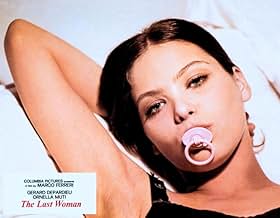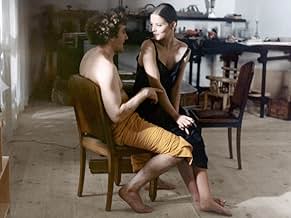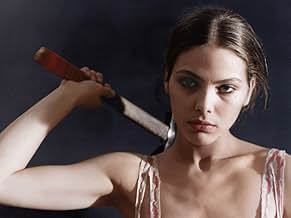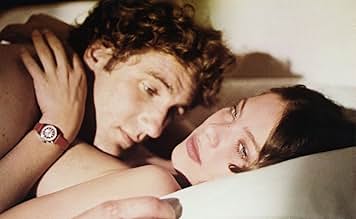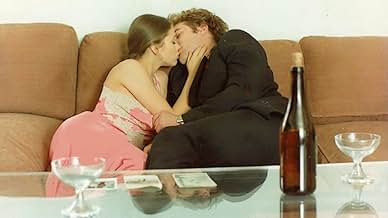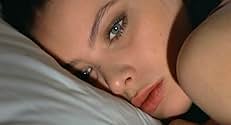VALUTAZIONE IMDb
6,4/10
1601
LA TUA VALUTAZIONE
Aggiungi una trama nella tua linguaGerard and his 9-month-old son have been left by his wife for feminist reasons. The custody of his son is being threatened by his next romance.Gerard and his 9-month-old son have been left by his wife for feminist reasons. The custody of his son is being threatened by his next romance.Gerard and his 9-month-old son have been left by his wife for feminist reasons. The custody of his son is being threatened by his next romance.
- Regia
- Sceneggiatura
- Star
- Premi
- 1 vittoria e 5 candidature totali
Nathalie Baye
- La fille aux cerises
- (as Natalie Baye)
Recensioni in evidenza
I am a Marco Ferreri fun, this superlative movie has Ornella Muti still young - she became my number 1 for years. I saw it in 1977. I must see this film again with more 23 years on my eyes. Recently I saw "L'Inconnu the Strasbourg" and I felt in love with the new "charm" of Ornella Muti as a mature woman and I cried of happiness. I hope to see her again soon.
Gérard (26 year-old G.Depardieu in a star-making, César-nominated performance) is the he-man single father of a little baby boy who meets carefree, sensuous Valérie (ravishingly beautiful 21 year-old Ornella Muti). They feel instantly attracted to each other, she moves in with him on the spot, they fall in love, she fancies playing stepmother to the baby, he gets jealous, she wants freedom, he gets enraged, she no longer fancies constant love-making, he gets desperate, they quarrel and fight, and things disintegrate until the totally shocking finale knocks you OUT!
This film was banned mostly everywhere outside Europe, including the US - and you won't find it in VHS or DVD for sale on Amazon, or for rent in your local store. I caught it on Cinemax Cable, late night. It's a step FURTHER than Ferreri's previous "La Grande Bouffe" in shocking power and sexual frankness, and so I've warned you. In this film, Ferreri questions issues like "couple", "love", "sex", "relationship", "family", "woman" and especially "man". He tells a love story exclusively from a macho point of view: the male characters (primitive, childish Depardieu, phony Piccoli, stupid Salvatori) are shamelessly misogynous and speak out their minds with no censorship or civilized "varnish" -- sensibility my a**.
Gérard eats, drinks, bites, sucks, spits, burps, shouts, f***s, harasses, fights, you name it - his bodily needs rule. And most of all, Gérard wonders what is the purpose of having a penis in women lib's times. The male organ is very much the center of the film, visually as well as metaphorically, representing men's questionable appendix in a world (Europe in the 70s) where family, marriage and male-female roles were being seriously questioned. In Gérard's character's own words, as he holds his son's penis in his hand: "All we are left with is the right to go around sporting one of these. But now they want to take away our pride in having them - we're not even allowed that anymore! So what are we supposed to do with them now?"
Depardieu was soon after to become France's biggest star since Delon/Belmondo. You can really think of no other actor more suitable to portray this childish-gross-larger-than-life he-man than Gérard, with his imposing figure and shameless physicality, total emotional assessment and unbelievable boldness - he's completely naked most of the time, is shown in explicit masturbation and has some 2 or 3 full erections, one of them in close-up, no body double!! (This was way before Viagra, mind you, and before Oshima, Bellocchio, Von Trier, Breillat, Larry Clark etc.). He was very probably the first major Western star to be shown like "that" in a non-porn film. The final scene in which he finally finds a way to "deal" with his manhood is one the most shocking EVER done.
Ornella Muti's nude beauty is also largely available here in some daring scenes, though her face is perhaps even sexier than her body - the combination of her catlike, dreamy green eyes, full lips, dark long hair, that lovely gap in her front teeth and the naughty girl-woman expression is very much a promise of liberated but life-changing sex.
"La Dernière Femme" ("The Last Woman") belongs to Italian director Marco Ferreri's great films, dealing with some of his favorite themes: destruction of male-female stereotypes, flesh/sex/ physiological urges as symbols of life and mortality, physical disability/decay/deformity/mutilation , all of them treated with highly acid sarcasm, a touch of surrealism, another of depression and a lot of dark humor. Ferreri belongs to a very selected group of rebel, risqué and subversively poetic filmmakers, along with Buñuel, Pasolini, Fassbinder, Portuguese João César Monteiro and very few others. A one-of-a-kind, he attracted great European stars who worked for him over and over again (Mastroianni, Tognazzi, Noiret, Piccoli, Salvatori, Depardieu, Girardot, Deneuve, Vlady, Schygulla, Muti, Romy Schneider etc etc) because they knew they would be given offbeat, once-in-a-lifetime roles.
Sadly, chances are you won't probably see a copy of "La Dernière Femme" anywhere, unless you look really hard for it. It contains extremely daring scenes, including Depardieu and Ornella having sex in bed with the baby around; nude Depardieu having his nude infant baby explore (I mean, REALLY explore!) Ornella's nude body; and another in which he proudly grabs his baby's willy and points it right at her bemused face. But don't be mislead: beyond the pleasure of shocking his audience, Ferreri firmly shoots us his uncomfortable questions: what is a modern man to do with/without his penis in (post-)feminist times? What the heck do women WANT from men, after all? If you thought "Sex and the CIty" you're galaxies away from "La Dernière Femme".
If you are a Ferreri fan and liked "La Grande Bouffe", "The Ape Woman", "The Queen Bee" or "Tales of Ordinary Madness", you should REALLY try to see this one - I guarantee you will NEVER see anything like it!! Not for the prude, humorless, conventional or romantic.
This film was banned mostly everywhere outside Europe, including the US - and you won't find it in VHS or DVD for sale on Amazon, or for rent in your local store. I caught it on Cinemax Cable, late night. It's a step FURTHER than Ferreri's previous "La Grande Bouffe" in shocking power and sexual frankness, and so I've warned you. In this film, Ferreri questions issues like "couple", "love", "sex", "relationship", "family", "woman" and especially "man". He tells a love story exclusively from a macho point of view: the male characters (primitive, childish Depardieu, phony Piccoli, stupid Salvatori) are shamelessly misogynous and speak out their minds with no censorship or civilized "varnish" -- sensibility my a**.
Gérard eats, drinks, bites, sucks, spits, burps, shouts, f***s, harasses, fights, you name it - his bodily needs rule. And most of all, Gérard wonders what is the purpose of having a penis in women lib's times. The male organ is very much the center of the film, visually as well as metaphorically, representing men's questionable appendix in a world (Europe in the 70s) where family, marriage and male-female roles were being seriously questioned. In Gérard's character's own words, as he holds his son's penis in his hand: "All we are left with is the right to go around sporting one of these. But now they want to take away our pride in having them - we're not even allowed that anymore! So what are we supposed to do with them now?"
Depardieu was soon after to become France's biggest star since Delon/Belmondo. You can really think of no other actor more suitable to portray this childish-gross-larger-than-life he-man than Gérard, with his imposing figure and shameless physicality, total emotional assessment and unbelievable boldness - he's completely naked most of the time, is shown in explicit masturbation and has some 2 or 3 full erections, one of them in close-up, no body double!! (This was way before Viagra, mind you, and before Oshima, Bellocchio, Von Trier, Breillat, Larry Clark etc.). He was very probably the first major Western star to be shown like "that" in a non-porn film. The final scene in which he finally finds a way to "deal" with his manhood is one the most shocking EVER done.
Ornella Muti's nude beauty is also largely available here in some daring scenes, though her face is perhaps even sexier than her body - the combination of her catlike, dreamy green eyes, full lips, dark long hair, that lovely gap in her front teeth and the naughty girl-woman expression is very much a promise of liberated but life-changing sex.
"La Dernière Femme" ("The Last Woman") belongs to Italian director Marco Ferreri's great films, dealing with some of his favorite themes: destruction of male-female stereotypes, flesh/sex/ physiological urges as symbols of life and mortality, physical disability/decay/deformity/mutilation , all of them treated with highly acid sarcasm, a touch of surrealism, another of depression and a lot of dark humor. Ferreri belongs to a very selected group of rebel, risqué and subversively poetic filmmakers, along with Buñuel, Pasolini, Fassbinder, Portuguese João César Monteiro and very few others. A one-of-a-kind, he attracted great European stars who worked for him over and over again (Mastroianni, Tognazzi, Noiret, Piccoli, Salvatori, Depardieu, Girardot, Deneuve, Vlady, Schygulla, Muti, Romy Schneider etc etc) because they knew they would be given offbeat, once-in-a-lifetime roles.
Sadly, chances are you won't probably see a copy of "La Dernière Femme" anywhere, unless you look really hard for it. It contains extremely daring scenes, including Depardieu and Ornella having sex in bed with the baby around; nude Depardieu having his nude infant baby explore (I mean, REALLY explore!) Ornella's nude body; and another in which he proudly grabs his baby's willy and points it right at her bemused face. But don't be mislead: beyond the pleasure of shocking his audience, Ferreri firmly shoots us his uncomfortable questions: what is a modern man to do with/without his penis in (post-)feminist times? What the heck do women WANT from men, after all? If you thought "Sex and the CIty" you're galaxies away from "La Dernière Femme".
If you are a Ferreri fan and liked "La Grande Bouffe", "The Ape Woman", "The Queen Bee" or "Tales of Ordinary Madness", you should REALLY try to see this one - I guarantee you will NEVER see anything like it!! Not for the prude, humorless, conventional or romantic.
i have looked for a copy of this film for many years. i was so happy the day i located it and have truly enjoyed it several times.
after seeing it, i could understand why the US would not allow it to be imported. there are many scenes that most will find offensive. most of which involve having a baby around during some of the sex scenes, which are fairly explicit - most with gerard's erection very apparent.
looking past the sex scenes, the movie is great. i truly enjoyed the idea of 'the penis rules the world' and that 'food is the comfort of the world' and how those two ideas combine to create on of the most shocking of all endings.
i will recommend this to all that have a true mature mind and can enjoy the 1970's style sexist attitudes without taking offense. of all of the movies i have in my collection, this is one that i very rarely lend out, i do not wish to take the chance of losing it!
after seeing it, i could understand why the US would not allow it to be imported. there are many scenes that most will find offensive. most of which involve having a baby around during some of the sex scenes, which are fairly explicit - most with gerard's erection very apparent.
looking past the sex scenes, the movie is great. i truly enjoyed the idea of 'the penis rules the world' and that 'food is the comfort of the world' and how those two ideas combine to create on of the most shocking of all endings.
i will recommend this to all that have a true mature mind and can enjoy the 1970's style sexist attitudes without taking offense. of all of the movies i have in my collection, this is one that i very rarely lend out, i do not wish to take the chance of losing it!
Before Lars von Trier (the 'bad' one - the one who directed 'Antichrist' and 'Nymphomaniac') there was Marco Ferreri. In 1976, when he made 'La dernière femme', the Italian screenwriter and director had wowed bourgeois audiences (and the members of the jury at the Cannes Film Festival) with 'La grande bouffe', a film in which four men gather to eat until they die. With the erotic drama 'La dernière femme' Ferreri probably set out to explore the limits again, tackling another theme related to human desires - sexuality and the ways in which it is perceived by men and women. The result was a controversial film, as he wanted, banned or limited for certain audiences in many cinema markets, the ending of which has become something of a legend in the history of cinema. It would not be Marco Ferreri's last 'shocking' film. I saw it almost half a century after it was made. I believe that if it was made today the film would be just as controversial, if not more controversial. But it's also a film that raises a lot of questions, bold in both theme and approach, with superb acting, famous actors in some of the most interesting roles of their careers, and enough mystery and ambiguity to leave room for hot debates.
Unlike the characters in 'La grande bouffe', who belong to the rich classes, the heroes of 'La dernière femme' are ordinary people, living in an urban environment unsettling by the rectangular artificiality of the buildings and the banality of the interiors. In the first scene of the film the engineer Gérard is fired from his job in a big chemical factory, but he does not seem at all affected by this situation. His worries are raising his one-year-old son and especially chasing after women. We learn soon that his wife had left him with the child in his care to devote herself to a feminist political career and perhaps to maintain a lesbian relationship. Gérard brings home Valerie, the gorgeous caretaker from the daycare where he was bringing his son. What starts as a casual fling develops into a complex relationship. Gérard and Valerie don't seem to match at all, what each is looking for in a relationship is as different as in the relationship between Mars and Venus. They don't love each other, they have a lot of sex, but neither finds satisfaction in their relationship, not to mention happiness. Is Valerie too immature? Is Gérard too self-absorbed? The two are neither able to love, nor separate, nor destroy each other. Maybe only themselves.
The acting performances are formidable. Gérard Depardieu makes one of his first great roles here, one of the creations in which he melts into the character and dominates it at the same time, a mixture of physical strength and vulnerability, sincerity and restrained violence. Ornella Muti is mesmerizingly beautiful, at once magnetic on the outside and cold on the inside, the exact opposite of the cerebral wife who had left her husband and child for political militancy. The characters remain open to interpretations and each of the viewers will have to judge which of them is the victim, if any. Or maybe they are both victims of circumstances, of a militant feminism that makes sense on the public stage but can become toxic in private? Michel Piccoli and Nathalie Baye also appear in supporting roles. Luciano Tovoli's cinematography creates an ambience that suggests the existential pressure of a world where society's indifference generates personal crises. Viewers who plan to watch 'La dernière femme' need to be warned about its extremes, but those who dare will be rewarded.
Unlike the characters in 'La grande bouffe', who belong to the rich classes, the heroes of 'La dernière femme' are ordinary people, living in an urban environment unsettling by the rectangular artificiality of the buildings and the banality of the interiors. In the first scene of the film the engineer Gérard is fired from his job in a big chemical factory, but he does not seem at all affected by this situation. His worries are raising his one-year-old son and especially chasing after women. We learn soon that his wife had left him with the child in his care to devote herself to a feminist political career and perhaps to maintain a lesbian relationship. Gérard brings home Valerie, the gorgeous caretaker from the daycare where he was bringing his son. What starts as a casual fling develops into a complex relationship. Gérard and Valerie don't seem to match at all, what each is looking for in a relationship is as different as in the relationship between Mars and Venus. They don't love each other, they have a lot of sex, but neither finds satisfaction in their relationship, not to mention happiness. Is Valerie too immature? Is Gérard too self-absorbed? The two are neither able to love, nor separate, nor destroy each other. Maybe only themselves.
The acting performances are formidable. Gérard Depardieu makes one of his first great roles here, one of the creations in which he melts into the character and dominates it at the same time, a mixture of physical strength and vulnerability, sincerity and restrained violence. Ornella Muti is mesmerizingly beautiful, at once magnetic on the outside and cold on the inside, the exact opposite of the cerebral wife who had left her husband and child for political militancy. The characters remain open to interpretations and each of the viewers will have to judge which of them is the victim, if any. Or maybe they are both victims of circumstances, of a militant feminism that makes sense on the public stage but can become toxic in private? Michel Piccoli and Nathalie Baye also appear in supporting roles. Luciano Tovoli's cinematography creates an ambience that suggests the existential pressure of a world where society's indifference generates personal crises. Viewers who plan to watch 'La dernière femme' need to be warned about its extremes, but those who dare will be rewarded.
The good news is this movie features some gratuitous nudity from the beauteous Italian actress Ornella Muti. The bad news is it features far, far more gratuitous nudity from the not-so-beauteous and quite corpulent French actor Gerard Depardieu. This is another slice of Italo-Gallic insanity from director Marco Ferreti. It somewhat resembles his later, more famous film "Ciao, Monkey", but instead of a baby monkey, Depardieu's character has a chubby human baby. But like the monkey in the later film, the male baby is largely a metaphor for the perpetual narcissistic infantilism of Depardieu's character.
Depardieu plays a single father whose feminist wife leaves him alone with their small baby. This doesn't slow down his inveterate womanizing,however, and he soon starts an affair with a young daycare teacher (Muti). It's a little disturbing, especially by modern-day standards, the way Depardieu and Muti engage in naked foreplay pretty much right in front of the baby (although they do have the decency to go into the next room to actually screw). Children that young have little memory, however, so I'm sure the infant actor was much less traumatized by Depardiue's bloated nude body than I was. Anyway, there's a lot of melodrama involving the Depardieu character's continuing compulsive infidelities and his feelings of male irrelevancy in the face of feminism and female sexual liberation. In fact, if the male organ with its insatiable appetites, extreme insecurities, and fickle nature somehow became an actual person it would be just like Depardieu's character in this movie. (So basically, Depardieu here plays a big chubby dick).
As other reviewers have said,the end of this movie is quite shocking-- Depardieu is harpooned by Captain Ahab and he drags him, his ship, and his entire crew to the bottom of the ocean. . . Oh wait, that was "Moby Dick". Well, the end of this movie is even more shocking, especially if you're male. Depardieu does give a very good performance, so I certainly would recommend this to his fans. Muti is not as good (but, oh man, is she beautiful), and this film really marks her transition to the kind of daring art films she is best known for (and without which she'd be a forgotten Italian version of Brooke Shields today) And whatever you can say about Marco Ferreti's films, they're definitely NOT dull. This not great, but check it out if it sounds interesting to you.
Depardieu plays a single father whose feminist wife leaves him alone with their small baby. This doesn't slow down his inveterate womanizing,however, and he soon starts an affair with a young daycare teacher (Muti). It's a little disturbing, especially by modern-day standards, the way Depardieu and Muti engage in naked foreplay pretty much right in front of the baby (although they do have the decency to go into the next room to actually screw). Children that young have little memory, however, so I'm sure the infant actor was much less traumatized by Depardiue's bloated nude body than I was. Anyway, there's a lot of melodrama involving the Depardieu character's continuing compulsive infidelities and his feelings of male irrelevancy in the face of feminism and female sexual liberation. In fact, if the male organ with its insatiable appetites, extreme insecurities, and fickle nature somehow became an actual person it would be just like Depardieu's character in this movie. (So basically, Depardieu here plays a big chubby dick).
As other reviewers have said,the end of this movie is quite shocking-- Depardieu is harpooned by Captain Ahab and he drags him, his ship, and his entire crew to the bottom of the ocean. . . Oh wait, that was "Moby Dick". Well, the end of this movie is even more shocking, especially if you're male. Depardieu does give a very good performance, so I certainly would recommend this to his fans. Muti is not as good (but, oh man, is she beautiful), and this film really marks her transition to the kind of daring art films she is best known for (and without which she'd be a forgotten Italian version of Brooke Shields today) And whatever you can say about Marco Ferreti's films, they're definitely NOT dull. This not great, but check it out if it sounds interesting to you.
Lo sapevi?
- QuizFor his role, Gérard Depardieu gained 33 pounds before filming began.
- ConnessioniEdited into Porno e libertà (2016)
I più visti
Accedi per valutare e creare un elenco di titoli salvati per ottenere consigli personalizzati
- How long is The Last Woman?Powered by Alexa
Dettagli
- Data di uscita
- Paesi di origine
- Lingua
- Celebre anche come
- The Last Woman
- Luoghi delle riprese
- Complexe pétrochimique, Carling, Moselle, Francia(chemical plant where Gérard works)
- Aziende produttrici
- Vedi altri crediti dell’azienda su IMDbPro
- Tempo di esecuzione1 ora 52 minuti
- Mix di suoni
- Proporzioni
- 1.85 : 1
Contribuisci a questa pagina
Suggerisci una modifica o aggiungi i contenuti mancanti

Divario superiore
By what name was L'ultima donna (1976) officially released in Canada in English?
Rispondi
